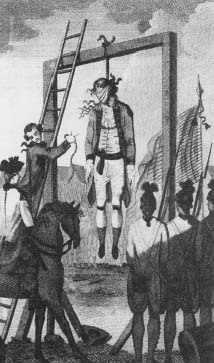The Blood of Tyrants chapter 4′s discussion of military tribunals just became a whole lot more current: minutes ago, President Obama announced that the United States will resume military commissions at the Guantanamo Bay, Cuba, detention facility. The President had previously suspended the use of these commissions, which provide the accused with few of the rights and protections afforded in trials. Now they are back.
This announcement is sure to be lambasted and praised by both sides. It portends that commissions are going to be a permanent part of the legal landscape. While the commissions and the context have certainly changed over the years, the basic idea behind these military proceedings has been around since our nation’s start.
Washington held military commissions during the Revolution. These military proceedings traditionally served as a “quick and dirty way” to eliminate the due process protections used in courts-marital and criminal trials to protect the accused. Commissions did not necessarily provide any fair trial protections to the defendant. Washington’s military commissions were not even meant to administer justice, they were only designed to merely examine. And after this brief examination, the accused was typically swiftly hanged.
While other trials were held under rules passed by Congress, commissions were held according to the Commander-in-Chief’s discretion and did not necessarily provide the accused with any protections whatsoever. The procedures of the trial – if one could even call them that – were largely left to the whims of General Washington. And his decision was final.
America used commissions in our struggle to found the United States. Should we still be using them now?


I’m not a historian, and not otherwise equipped to offer intelligent commentary on this subject, but reading this post, I was struck by how apropos the Revolutionary War (and perhaps even more so, the War of 1812) are to contemporary questions about boundaries of executive power. People have said that the war on terror is special because of its global scope. It is this global scope that has been pointed to for a “new” look at how executive detention power should be applied (whether to achieve the tactical purpose of keeping an enemy soldier from returning to the battle, or the aim of trying and punishing those who have committed crimes under a military — as opposed to a civilian — code). The justification for the new look that I’ve heard goes something like: now that the war is global and the battlefield ill defined, there is a greater danger of abusive detentions of non-combatants (including American non-combatants). But given that the initial wars America fought were on American soil, the possibility that presidential powers could be abused to detain innocents (including American innocents) may not really be completely novel. And by 1812, we certainly already had the Constitution and a Bill of Rights, so maybe our approach to prisoners in that war can say something about original understandings of executive detention power. Anyway, just my few cents. I very much enjoy your blog.
Pingback: Prosecuting Evil « The Blood of Tyrants